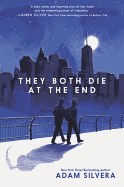
Mateo is a homebody. Raised by his father, he does a lot of his living vicariously through the Internet. In Mateo's similar but alternate version of our present, there is a company, Death-Cast, that calls people--Deckers--to let them know they will die within the day--not how they will die, just that they will die before the clock strikes midnight. At 12:22 a.m., Mateo gets a call from Death-Cast.
At 1:05 a.m., Rufus is beating his ex-girlfriend's new boyfriend to a bloody pulp. His phone begins to ring. Recently orphaned, Rufus already has some experience with Death-Cast: they called a few months ago to announce that his mother, father and sister would all be leaving him in the same day. Now, they're calling for him. Rufus finishes with the boyfriend and gets his best friends together, only to find himself running away from his own funeral as the cops come after him for assault.
Now both alone, Mateo (whose father is in a coma) and Rufus meet through an app designed to give lonely Deckers someone with whom they can spend their last day. As the day goes on, Rufus drags Mateo out of his shell ("Wow," he says, "you're like a tourist in your own city"), Mateo helps Rufus come to appreciate himself, and their relationship develops into something more than a friendship. Their dialogue is fun and funny, tender and affecting. Toward the end of their day, Mateo asks, "Weird question: Do you believe in the afterlife?" "That's not weird," Rufus answers, "we're dying."
Told in Mateo and Rufus's alternating first-person present narration with occasional third-person accounts from individuals who interact with the two on their last day, Silvera's (History Is All You Left Me) novel offers a fast-paced countdown to the inevitable, heartbreaking ending. --Siân Gaetano, children's and YA editor, Shelf Awareness

